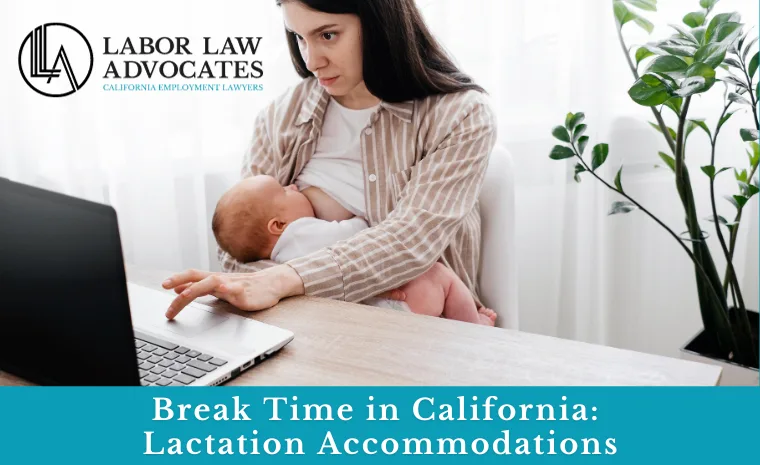Break Time in California: Lactation Accommodations
In the vast landscape of break time in California’s labor laws, there exists a cluster of regulations that safeguard employees’ rights during their workdays. There’s nothing like hot food and rest to refresh during work. These laws, while seemingly straightforward, carry significant weight in ensuring the well-being, productivity, and job satisfaction of an employee.
In this blog, we will explore the multifaceted field of break for employees in California. Not only mandated meal and rest breaks, but also the lesser-known, yet equally vital, lactation accommodation requirements that all employers must adhere to. This will include the legal obligations imposed on employers, the consequences of non-compliance with rest and meal periods, and the practical implications of these laws for both employers and employees.
Additionally, we will address some commonly asked questions regarding lactation break laws and provide insights into best practices for employers in navigating this aspect of California labor law. In particular:
- Defining types of break time in California labor law
- Lactation accommodations in the workplace
- Some exceptions to lactation accommodation laws
- Frequently asked questions about lactation break laws in California
Your employee doesn’t respect break periods?
Defining Types of Break Time in California Labor Law
Proper meal breaks and rest periods play a crucial role in ensuring the well-being of employees. For that reason, California has specific regulations governing meal and rest break requirements to protect the health, safety, and working conditions of workers. Some key aspects of the importance of rest and meal break periods in our state’s labor law are:
Meal Breaks
- California law on work breaks requires employers to provide employees with an uninterrupted 30-minute break to eat a meal when they work for more than five hours in a day.
- If a worker has full-time employment or more than ten hours in a day, they are entitled to a second 30-minute unpaid meal break.
- Meal break laws offer employees an opportunity to rest, eat, and recharge during their shifts, promoting their overall well-being and productivity.
Rest Breaks
- California law also mandates paid rest breaks for employees. Employees are entitled to a 10-minute rest break for every four hours worked or “major fraction” thereof.
- Rest breaks are designed to give employees short periods of rest and relaxation, enhancing their ability to perform their job effectively.
Lactation Breaks
- California law also mandates employers to provide reasonable lactation breaks for nursing mothers. These breaks ensure that employees who are breastfeeding have the time and space they need to express breast milk while at work, contributing to the well-being of both the mother and her child.
Legal Protections
- Employers must not interfere with employees’ rights to take their mandated rest or lunch breaks.
- Employees who are denied their meal, rest, or lactation breaks or who are not provided with the opportunity to take them can be eligible for premium pay as compensation.
Enforcement
- The California Division of Labor Standards Enforcement (DLSE) and the California Labor Commissioner’s Office are responsible for rest break requirements, enforcing labor laws including lactation or meal break violations.
- Employees can file complaints if their rights regarding meal, lactation or rest break periods are violated, and employers can face penalties for non-compliance.
Employee Health and Safety
- Rest and 30-minute meal break requirements contribute to the physical and mental well-being of employees, reducing the risk of fatigue, stress, and burnout.
- Adequate breaks help maintain workplace safety by reducing the chances of accidents or mistakes caused by exhaustion.
Meal and rest break time in California labor law protect the rights and well-being of employees. By ensuring that workers have the opportunity to take meal and rest breaks during their shifts, these regulations contribute to a healthier and safer work environment, employee productivity, and overall job satisfaction. Employers must comply with these laws to promote fair and safe working conditions for their employees.

Lactation Accommodations in the Workplace
In recent years, California has emerged as a trailblazer in advancing workplace rights and protections, particularly in areas that affect equality among employees. One such crucial area is lactation accommodations for nursing mothers.
Here is a breakdown of these regulations to better understand the rights and responsibilities involved in lactation accommodations in the workplace.
The Legal Framework
California Labor Code Section 1030 outlines the legal requirements for lactation accommodations in the workplace. These provisions ensure that nursing mothers have the necessary time and space to express breast milk while at work. Employers must adhere to these regulations to promote a conducive and supportive work environment for employees who are breastfeeding.
Lactation Accommodation Requirements
Employers in California are obliged to provide the following lactation accommodations:
- Time for Lactation Breaks: Employees who are nursing mothers are entitled to reasonable, unpaid break time to express breast milk. The law requires employers to provide adequate time for these breaks, which must be in addition to the regular rest and meal breaks.
- Private Lactation Space: Employers must provide a private lactation space other than a bathroom for employees to express breast milk. This space should be free from intrusion and should be shielded from view. It must also be safe, clean, and free of any hazardous materials.
- Compliance and Penalties: Non-compliance with these lactation accommodation requirements can lead to significant legal consequences for employers. Violations can result in monetary penalties, as well as potential lawsuits from affected employees.
Best Practices for Employers
To ensure compliance with California’s lactation accommodation laws, employers can take the following steps:
- Designate a Lactation Area: Set aside a private, secure space specifically for lactation purposes, equipped with comfortable seating, electrical outlets, and necessary amenities.
- Develop a Lactation Accommodation Policy: Create and implement a comprehensive policy that outlines the procedures for requesting lactation breaks, identifies the designated lactation space, and educates employees about their rights.
- Communication and Training: Train management and HR personnel to be knowledgeable about lactation accommodation laws to facilitate requests and ensure compliance.
- Flexibility: Be flexible in accommodating the needs of nursing mothers and ensure that their requests for lactation breaks are met.
- Documentation: Keep records of lactation accommodation requests and their resolutions to demonstrate compliance in the event of audits or legal disputes.
A strong emphasis on supporting nursing mothers in the workplace is established by requiring employers to provide lactation accommodations. Complying with these legal requirements not only ensures that employers meet their obligations but also fosters a more inclusive and supportive work environment. It’s critical that employers follow these laws to create a workplace where the rights of nursing mothers are respected and protected.
Lactation accommodations are a right in California.
Some Exceptions to Lactation Accommodation Laws
Some industries or workplaces may have exceptions or provisions for lactation break laws due to their unique nature, daily work time or operational constraints. While the right to lactation breaks is protected by law, specific accommodations can vary depending on the circumstances. Here are a few examples of situations where exceptions or provisions for lactation breaks might apply:
Emergency Services and Healthcare
Industries that provide critical and continuous operations or emergency services, such as healthcare and emergency response, may have exceptions in place. In these fields, staffing levels and immediate patient care can sometimes make it challenging for employees to take breaks precisely when needed. However, employers in these industries are still required to make reasonable efforts to provide lactation accommodations.
Agriculture
Agriculture and farming often involve remote or outdoor work where it might be challenging to find a suitable and private lactation space. In such cases, employers are expected to make reasonable efforts to accommodate nursing employees, considering the available resources and conditions.
Small Businesses
Smaller businesses with limited space and resources may encounter challenges in providing dedicated lactation facilities. While they are still required to meet the legal obligations, the accommodations may differ based on the available resources.
Commission-Based Sales
In some commission-based sales positions with varying hourly rates, employees have flexibility in their schedules. They might need to negotiate the timing of lactation breaks with their employers to align with their work commitments.
Unionized Workplaces
Collective bargaining agreements in unionized workplaces may specify unique provisions for lactation breaks. These agreements can supersede or modify state laws, so it’s essential to review the terms outlined in the specific labor contracts.
Telecommuting or Remote Work
In situations where employees work remotely or telecommute, employers may need to establish flexible arrangements for lactation breaks, as the physical workplace is not the traditional office setting.
These exceptions do not exempt employers from their obligation to make reasonable efforts to accommodate nursing mothers. Employers are required to work with exempt workers to ensure that their needs are met as closely as possible within the constraints of the job.
As a rule of thumb, If you have concerns about your specific workplace or industry, it’s advisable to consult with your HR department or an employment attorney to better understand the accommodations and rights available to you as a nursing mother.
Frequently Asked Questions about Lactation Break Laws in the Workplace
What are lactation breaks, and why are they important?
Lactation breaks are designated periods during the workday that allow nursing mothers to express breast milk. These breaks are important because they support the health and well-being of both the mother and her child. Lactation break laws enable working mothers to continue breastfeeding and contribute to a healthier work environment by reducing stress and discomfort.
Am I entitled to lactation breaks at work?
If you are a nursing mother working in California, you are entitled to reasonable, unpaid lactation breaks. California law mandates that employers provide these breaks to eligible employees.
How many lactation breaks am I entitled to, and for how long?
The law does not specify the exact number or duration of lactation breaks for both salaried employees and minimum wage workers. Employers are required to provide a reasonable amount of break time for lactation, which may vary depending on individual needs. The breaks should be in addition to any regular rest or meal breaks.
Is there a designated lactation space in my workplace?
Employers in California must provide a private and secure lactation space other than a bathroom. This space should be clean, safe, and shielded from view, with appropriate seating and electrical outlets.
Do I have to notify my employer in advance about my need for lactation breaks?
While it’s a good practice to inform your employer of your need for lactation breaks, you may request these breaks as needed. Employers should accommodate your requests to the best of their ability.
Can my employer refuse my request for a lactation break?
Employers must make reasonable efforts to accommodate lactation breaks, but there could be instances where operational constraints make it difficult to provide an immediate break. However, they are generally not allowed to outright refuse your request.
Can my employer schedule my lactation breaks at specific times?
Employers should work with employees to establish a reasonable schedule for lactation breaks. However, employers may consider operational needs when determining the timing of these breaks.
What if my employer is not complying with lactation break requirements?
If your employer is not complying with lactation break regulations, you can file a complaint with the California Division of Labor Standards Enforcement (DLSE) or the California Labor Commissioner’s Office. You may also consult with an employment attorney to explore legal remedies.
Are there consequences for employers who do not provide lactation accommodations?
Employers who fail to provide the basic requirements for lactation accommodations may face monetary penalties and legal action. Employees may file lawsuits for non-compliance.
Are lactation breaks paid or unpaid?
Lactation breaks are typically unpaid, especially for minimum wage workers. However, some employers may offer paid breaks at their discretion, so it’s essential to check your company’s policies. It’s also advisable to communicate openly with your employer about your needs to ensure a smooth and supportive lactation experience in the workplace.
Consult With a California Employment Lawyer Today
California’s labor laws, including lactation accommodation laws, are in place to protect workers from being taken advantage of during their daily work time. Employers must follow these laws to avoid penalties, and employees should be aware of their rights to ensure they are treated fairly and get a successful claim in case of legal action.
Labor Law Advocates is dedicated to protecting these rights while holding employers accountable for their unlawful deeds. Understanding California’s rest and meal break laws is essential for both employers and employees, and we hope this guide has given you a better understanding of how they work.
Consult with the most experienced employment lawyers in California for legal advice today. Speak with one of the experts at Labor Law Advocates for a free consultation. We are available 24/7. Call us anytime at (424)-688-3632.




